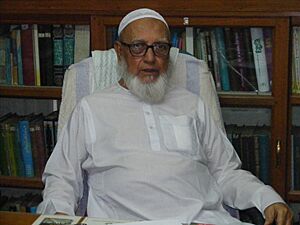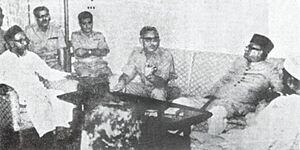Ghulam Azam facts for kids
Quick facts for kids
Ghulam Azam
|
|
|---|---|
 |
|
| Born | 7 November 1922 |
| Died | 23 October 2014 (aged 91) Bangabandhu Sheikh Mujib Medical University, Dhaka, Bangladesh
|
| Resting place | Moghbazar, Dhaka |
| Nationality | British Indian (1922–1947) Pakistani (1947–1994) |
| Alma mater | Dhaka University |
| Occupation | Teacher, Leader of Jamaat-e-Islami Bangladesh |
| Known for | Genocide of Bangladesh Liberation War, War crimes, Islamist Politics |
| Political party | Bangladesh Jamaat-e-Islami |
| Criminal status | Deceased |
| Spouse(s) | Afifa Azam |
| Children | 6, including Brig. Gen. Azmi |
| Conviction(s) | Conspiracy and incitement in committing genocide in 1971 Liberation war of Bangladesh |
| Criminal penalty | 90 years imprisonment |
| Leader of Jamaat-e-Islami Bangladesh Jamaat-e-Islami East Pakistan (1960-1971) |
|
| In office 1960–2000 |
|
| Preceded by | Abdur Rahim |
| Succeeded by | Motiur Rahman Nizami |
| Personal details | |
| Political party | Jamaat-e-Islami |
Ghulam Azam (Bengali: গোলাম আযম; Urdu: غلام اعظم; 7 November 1922 – 23 October 2014) was a well-known Bangladeshi Islamist politician. He was the former leader, or Emir, of Bangladesh Jamaat-e-Islami. This was a major Islamist political party in Bangladesh.
Azam was arrested in 2012 for his actions during the 1971 Bangladesh Liberation War. A special court later found him responsible for certain activities during that war. He was sentenced to a long prison term.
During the war, he was part of Jamaat-e-Islami Pakistan. He did not support the idea of Pakistan breaking apart. After the war, he led the Jamaat-e-Islami Bangladesh until the year 2000.
He was accused of helping to form groups that supported the Pakistani Army. These groups included the Razakars and Al-Badr. These groups opposed the Mukti Bahini, who were fighting for Bangladesh's independence.
Ghulam Azam's Bangladeshi citizenship was taken away because of his role during the war. He lived in Bangladesh without official papers for many years. Later, the highest court in Bangladesh gave him back his citizenship. He passed away in 2014 at the age of 91.
Contents
Early Life and Education
Ghulam Azam was born on 7 November 1922 in Dacca, which was then part of British India. He was the oldest child of Sheikh Ghulam Kabir and Sayeda Ashrafunnisa. His family came from a village called Birgaon.
His education started at a local religious school, called a madrasa. He then finished his high school studies in Dhaka. After that, he went to Dacca University. There, he earned degrees in political science.
Early Political Career
University Days
While at Dhaka University, Azam became active in student politics. He was elected as the General Secretary of the Dhaka University Central Students' Union (DUCSU). He held this position for two years, from 1947 to 1949.
In 1947, as DUCSU General Secretary, Azam presented a request to the Prime Minister of Pakistan. He asked that Bengali be made an official state language alongside Urdu. At that time, Bangladesh was known as "East Pakistan" and was part of Pakistan.
Joining Jamaat-e-Islami
In 1950, Azam left Dhaka to teach political science in Rangpur. During this time, he was inspired by the writings of Abul Ala Maududi. In 1954, he joined Maududi's political party, Jamaat-e-Islami Pakistan. Later, he became the Secretary General of the party's branch in East Pakistan.
In 1964, the government banned Jamaat-e-Islami. Azam and other leaders were put in prison for eight months without a trial. He played an important role in the Pakistan Democratic Movement, formed in 1967. In 1969, he became the leader (Ameer) of Jamaat in East Pakistan. He also took part in important political meetings to solve problems in Pakistan.
Bangladesh Liberation War
Actions During the 1971 War
During the Bangladesh Liberation War, Azam supported a united Pakistan. He often spoke against the Awami League and Mukti Bahini. These groups wanted to create an independent country called Bangladesh. Azam's speeches were published in The Daily Sangram, a newspaper of his party. On 20 June 1971, Azam stated his support for the Pakistani army.
Peace Committees
During the 1971 war, Azam was involved in forming the East Pakistan Central Peace Committee. This group was created on 11 April 1971. It claimed that the independence movement was a plan by India. Members of this committee came from Azam's party, Jamaat-e-Islami, and other groups.
The Peace Committee worked with the army. They informed on local people and government workers. They were also accused of taking over shops and lands from Hindus and people who supported independence. These properties often belonged to friends or family of Mukti Bahini fighters.
The Peace Committee was also accused of recruiting members for the Razakars. These were local groups that helped the Pakistani army. The first Razakar recruits included members of Jamaat. Another group, Al-Badr, was also formed by a leader of Jamaat's student wing. Azam denied that the Peace Committee was directly linked to the Razakars. He said these groups were formed by the government.
Azam traveled to West Pakistan during the war to meet with Pakistani leaders. He said his party was trying to stop the activities of those who wanted independence. He met with General Yahya Khan, Pakistan's military ruler, to plan against Bangladesh's independence.
Statements Against India
On 12 August 1971, Azam stated in the Daily Sangram that "supporters of the so-called Bangladesh Movement are enemies of Islam, Pakistan, and Muslims." He also called for a war against India. He even suggested that Assam should become part of Pakistan.
Azam was also accused of suggesting a plan to harm Bengali intellectuals. This plan was reportedly discussed in September 1971. According to this plan, the Pakistani Army and local helpers harmed many Bengali intellectuals on 14 December 1971. Azam later denied these accusations. He said his opposition to Bangladesh's creation was only political. He also worried about India's economic power.

Leader of Jamaat-e-Islami Bangladesh
After Bangladesh became independent, the new government banned Bangladesh Jamaat-e-Islami. They also took away Azam's citizenship because he opposed Bangladesh's independence.
He moved to Pakistan and lived in London for a while. In 1978, he was allowed to return to Bangladesh using a Pakistani passport. He stayed in Bangladesh as a Pakistani citizen until 1994, even after his visa ran out. He refused to leave the country.
Jamaat-e-Islami became active again when Ziaur Rahman became president in 1975. He removed the ban on religious parties. In 1977, Zia changed the constitution to include Islamic ideas. This made it easier for Jamaat-e-Islami to rejoin politics.
In the 1980s, Azam spoke out against the military rule of Hussain Muhammad Ershad. Jamaat-e-Islami joined other parties in protests. Azam suggested a system where a neutral caretaker government would oversee elections. This system was adopted in 1990. In the 1991 election, Jamaat-e-Islami won 18 seats. Their support helped another party, the Bangladesh Nationalist Party (BNP), form a government.
During this time, Azam was the unofficial leader of Jamaat-e-Islami. In 1991, he was officially elected to the position. This led to his arrest. A group of citizens, led by Jahanara Imam, formed an unofficial "People's Court." This court aimed to try people accused of actions against independence. This court symbolically found Azam responsible for his actions during the war. In 1994, after a long legal fight, the Supreme Court of Bangladesh gave him back his citizenship.
In the 1996 election, Jamaat won only three seats. Azam announced his retirement from politics in late 2000. Motiur Rahman Nizami took over as the party leader.
Death
Ghulam Azam passed away on 23 October 2014, at Bangabandhu Sheikh Mujib Medical University (BSMMU). He suffered a stroke while in prison for his actions during the Bangladesh Liberation War. He was also suffering from kidney problems.
Azam was buried in his family graveyard in Moghbazar, Dhaka, on 25 October. His funeral prayer, called namaz-e-janaza, was held at Bangladesh's national mosque, Baitul Mokarram. This was one of the largest funeral gatherings ever seen there. Some people in the country protested against his body being taken to the national mosque. This was due to his past actions and his opposition to Bangladesh's independence.
Family
His son, Abdullahil Amaan Azmi, was a brigadier in the Bangladesh Army.
|
 | Kyle Baker |
 | Joseph Yoakum |
 | Laura Wheeler Waring |
 | Henry Ossawa Tanner |

